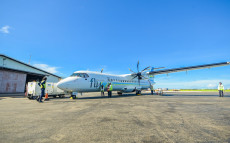- pathfindersAI
- Job Profile
Transportation Vehicle, Equipment and Systems Inspectors, Except Aviation
Summary
Transportation Vehicle, Equipment, and Systems Inspectors, Except Aviation
What They Do
Transportation Vehicle, Equipment, and Systems Inspectors, Except Aviation, play a crucial role in the comprehensive maintenance and safety assurance of various transportation modes and systems. These professionals meticulously examine a wide range of machinery and transportation systems, ensuring that vehicles such as trucks, buses, and rail systems comply with rigorous safety standards and regulatory requirements. While aviation is excluded from their focus, their expertise spans across public and private ground transportation, fostering a reliable, secure, and efficient transportation network essential for commerce and daily life.
Job Responsibilities
The responsibilities of Transportation Vehicle, Equipment, and Systems Inspectors are manifold and require a deep understanding of mechanical systems and regulatory frameworks. Their daily tasks often include conducting thorough inspections of vehicles and equipment, identifying potential safety hazards, and ensuring compliance with local, state, and federal regulations. These inspectors meticulously document their findings, recommending necessary repairs and overseeing corrective actions. Additionally, they may conduct follow-up inspections to verify that issues have been resolved effectively. Their commitment to safety often extends to training vehicle operators on proper maintenance procedures and safety practices, thereby enhancing the overall functionality and longevity of transportation systems.
Essential Skills
To excel in this field, an inspector must possess a robust set of skills. A keen eye for detail is paramount, allowing them to identify even the slightest discrepancies or wear in mechanical components. Strong analytical skills enable them to interpret complex technical data and regulatory guidelines accurately. Proficiency in using diagnostic tools and equipment is also essential for conducting precise inspections. Effective communication skills are necessary for documenting findings and conveying recommendations clearly to vehicle operators, maintenance personnel, and regulatory bodies. Moreover, physical stamina and manual dexterity are crucial, as the job often involves working in various physical environments and requiring the handling of tools and mechanical components.
Educational Pathways
Aspiring Transportation Vehicle, Equipment, and Systems Inspectors typically begin their career journey with a high school diploma or equivalent. However, postsecondary education in fields such as automotive technology, diesel mechanics, or a related discipline greatly enhances job prospects and proficiency. Many technical and community colleges offer specialized training programs that combine classroom instruction with hands-on experience. Additionally, acquiring relevant certifications, such as those from the National Institute for Automotive Service Excellence (ASE) or similar entities, can significantly bolster one’s credentials. On-the-job training and apprenticeships further refine the skills necessary for success in this demanding profession.
Career Prospects
The demand for Transportation Vehicle, Equipment, and Systems Inspectors is expected to remain steady, driven by the imperative need for safety and regulatory compliance in the transportation sector. Employment opportunities are prevalent in various settings, including government agencies, private transportation companies, and independent inspection firms. Career advancement is possible through continuous education and gaining substantial experience, with opportunities to move into supervisory or specialized inspection roles. Additionally, the ever-evolving nature of transportation technology underscores the potential for ongoing professional development and specialization in advanced inspection methodologies.
Conclusion
Transportation Vehicle, Equipment, and Systems Inspectors, Except Aviation, are integral to maintaining the safety and efficiency of our transportation infrastructure. Their meticulous work ensures that vehicles and systems operate within the confines of strict safety standards, safeguarding passengers, operators, and the public at large. With a combination of specialized education, essential skills, and a commitment to ongoing learning, individuals in this profession can expect a fulfilling career marked by continuous growth and significant societal impact. As guardians of transportation safety, these inspectors contribute profoundly to the reliable and effective movement of people and goods, a cornerstone of modern life.
Video
Compensation
| State | Median Salary | Median Hourly | Positions |
|---|---|---|---|
| AL | 78,400 | 37.69 | 130 |
| AZ | 44,880 | 21.58 | 740 |
| AR | 81,160 | 39.02 | 100 |
| CA | 74,780 | 35.95 | 1,900 |
| CO | 55,820 | 26.84 | 520 |
| CT | 78,520 | 37.75 | 190 |
| DE | 65,280 | 31.39 | 40 |
| DC | 97,130 | 46.70 | 140 |
| FL | 83,350 | 40.07 | 1,820 |
| GA | 94,220 | 45.30 | 930 |
| HI | 90,380 | 43.45 | 170 |
| ID | 104,060 | 50.03 | 90 |
| IL | 61,450 | 29.54 | 840 |
| IN | 65,440 | 31.46 | 310 |
| IA | 71,310 | 34.29 | 120 |
| KS | 99,520 | 47.85 | 250 |
| KY | 88,780 | 42.68 | 290 |
| LA | 85,570 | 41.14 | 100 |
| ME | 52,890 | 25.43 | 120 |
| MD | 85,260 | 40.99 | 370 |
| MA | 92,870 | 44.65 | 450 |
| MI | 77,660 | 37.34 | 310 |
| MN | * | * | 230 |
| MS | 70,790 | 34.04 | 100 |
| MO | 54,530 | 26.22 | 370 |
| MT | 60,160 | 28.92 | 140 |
| NE | 94,690 | 45.52 | 130 |
| NV | 95,680 | 46.00 | 230 |
| NH | 108,700 | 52.26 | 30 |
| NJ | 46,750 | 22.48 | 1,300 |
| NM | 60,130 | 28.91 | 130 |
| NC | 73,200 | 35.19 | 380 |
| ND | 95,630 | 45.97 | 60 |
| OH | 75,920 | 36.50 | 540 |
| OK | 91,100 | 43.80 | 270 |
| OR | 91,100 | 43.80 | 180 |
| PA | 67,180 | 32.30 | 410 |
| SC | 76,000 | 36.54 | 120 |
| SD | 73,880 | 35.52 | 90 |
| TN | 76,230 | 36.65 | 380 |
| TX | 81,020 | 38.95 | 3,400 |
| UT | 53,460 | 25.70 | 240 |
| WA | 95,730 | 46.03 | 490 |
| WV | 47,740 | 22.95 | 100 |
| WI | 104,580 | 50.28 | 50 |
Similar Occupations
In this area you will find other occupations that are close to the one you were viewing in tasks, knowledge and work environment. If the primary job profile you are viewing isn't quite to your liking, take a look around and see what else is available.
Basic and Premium Accounts have more alternative occupations available than the Free account.

Automotive Engineering Technicians - 17-3027.01
Automotive Engineering Technicians assist in the development, testing, and fine-tuning of vehicle systems and components by conducting performance assessments and implementing design improvements. They collaborate with engineers to troubleshoot issues, ensure compliance with safety standards, and enhance the efficiency and reliability of automotive technologies.
-
$64,020/yr
Median Pay -
38,930
Number of Jobs

Aviation Inspectors - 53-6051.01
Aviation Inspectors ensure the safety and compliance of aircraft by examining engines, instruments, and other systems, conducting pre-flight and post-flight inspections, and verifying that maintenance and repair procedures meet regulatory standards. They also review maintenance logs and repair records to ensure that all required inspections and maintenance are completed correctly and on schedule.
-
$87,290/yr
Median Pay -
27,670
Number of Jobs